(This article was first published on 6 Sep 2009 & enhanced on 18 Aug 2013.)
Update, 8 Dec 2013 : Keep yourself more informed from these Twitter pages: Women for Schapelle, BobCarr Cover-up & Kim Bax.
Update, 17 Aug 2013 : An ABC radio news bulletin reports: "Convicted Australian drug smuggler Schapelle Corby has not received a sentence cut as part of Indonesia's Independence Day celebrations." This was contrary to earlier reports that she had been given hope of an early release. Unless her sentence is reduced, she is not eligible for release until 24 March 2017. See also: Schapelle to be sent to die in remote Java prison of 5 April 2010, A selective capacity for human compassion? of 24 Feb 2010, Your support for clemency bid needed to save Schapelle's life 12 of Feb 2010, Schapelle Corby's story told on Truth News Radio of 23 Sep 2009.

On 27 May 2005, Schapelle Corby was found guilty not by a jury, but by a judge, of attempting to smuggle 4.2kg of cannabis into Indonesia and sentenced to 20 years' jail. However, even a cursory look at the case against Schapelle Corby, for example on Wikipedia, will reveal that the evidence against her is almost non-existent, whilst evidence, pointing to the guilt of the Balinese Police, a coverup and the scapegoating of Corby, is overwhelming. The newsmedia's failure to make this widely understood is yet another of countless examples of its failure in its duty to the Australian public.
See also: The political sacrifice of Schapelle Corby of 8 Feb 14 (includes video from Expendable Project story), http://www.freeschapelle.com.au (as of 9 Feb 2014, web-site no longer exists), "Your support for clemency bid needed to save Schapelle's life" of 12 Feb 10, http://www.schapelle.net/, "Kevin Rudd gives Schapelle Corby a raw deal" by Jill Singer in the Herald Sun of 27 Aug 2009, "Schapelle Corby paranoid, clutching doll in Kerobokan jail" by Cindy Wockner and Kormang Suriadi in the Daily Telegraph of 25 May 09, "Premier backs call to bring Schapelle Corby back to Australia" in the Herald Sun of 25 Aug 09, "Schapelle Corby 'clinically insane'" by Adam Gartrell in News Ltd online of 24 Aug 09.
For its part, our Government's failure to insist that at least due process and international and Indonesian law be applied in the case of Schapelle Corby is yet another of many examples, stretching back to at least the murder of the Balibo Five in East Timor in 1975, of its failure to act protect citizens of this country.
In fact, the charge of having attempted smuggle cannabis out of Australia and into Indonesia rather than the reverse had always struck me as improbable. However, with so with so many other controversies, which require research and thought to arrive at the truth, going on, I made the choice to put the issue to the back of my mind.
I was made properly aware of the overwhelming evidence of Schapelle Corby's innocence when I attended the Brisbane Forum on Saturday 5 September at public meeting in Beenleigh put on by the Brisbane Forum. The case for Schapelle Corby's innocence of the charges against her was put by Roy.

Roy presents conclusive evidence of Schapelle Corby's
innocence to Brisbane Forum meeting of 5 Sep 09.
Good day Ladies & Gentlemen.
My name is Roy, I live in South East Queensland, and I am the Captain of an offshore oil rig tender working in the Timor Sea. I have been in the offshore oil industry for 28 years.
There would not be a person in this room who has not heard of Schapelle Corby, a woman made famous for all the wrong reasons, and I have little doubt that some here think she is "Guilty".
I happen to know, however, that Schapelle is "Innocent". It is not my belief or my opinion, it is a FACT, plain and simple, and over the course of this presentation I hope to prove it to you.
Roy's close association with Corby Family
So, what are my credentials? What authority do I have to make such a claim, when everything we see, hear and read about in newspapers tells us that Schapelle is "Guilty" and that her whole family have been dealing in drugs for decades?
I have known the Corby family for 20 years and I am a close family friend. I am also part of a small and trusted group who are regarded as Schapelle's strongest advocates.
I have studied her case for several years now, and I happen to believe there is not too much about it that I don't know.
In March this year I visited Schapelle in Kerobokan Prison, along with her mother Rosleigh, two of her Aunts and a friend of Schapelle's named Katrina.
Katrina was one of Schapelle's travelling companions on that fateful trip to Bali in October 2004.
Thankfully, Schapelle was in a lot better shape then, than she is now.
Having not seen Schapelle since her childhood years, when I visited her in March it was, in many ways, like meeting her for the first time.
I found her to be one of the most charming and lovely persons you could ever hope to meet, and I knew then and there what I had believed all along -- There is NO way that she committed this crime.
Roy's abhorence of illicit drugs caused by personal tragedy
Before I continue, you should know that my Wife and I lost our son to illicit drugs 11 years ago. As such, I have no tolerance for illicit drugs or those dealing in them1.
As far as I am concerned, you commit the crime, you do the time, providing the sentence is fair and reasonable punishment.
The evidence of Schapelle Corby's innocence
However, by the same token, if you are innocent, you should be set free. "The Innocent Should Not Be Punished".
Schapelle is not a drug dealer, a drug smuggler, or a drug trafficker. She never has been.
Everything you thought you knew about her, and her case, needs to be seriously re-evaluated.
Prior to her fateful trip to Bali in October 2004, Schapelle had no criminal record and was, to all intents and purposes, a law abiding citizen. Despite being convicted of drug smuggling in Bali, she has no proven association with illicit drugs, or anyone dealing in them, in Australia.
And yet, Ladies and Gentlemen, there was marijuana in her boogie-board bag. This fact is indisputable.
So, apart from the intimate knowledge that I have through my friendship with the Corby family, and Schapelle herself, what else do I have to support the notion that she is "Not Guilty"?

The value of the drugs in Australia would have been around $35,000 and in Bali around $5,000. So, who in their right mind would take a chance on receiving a death sentence, or a life sentence in a third world prison, just to lose $30,000?

Firstly, there was no motive. The value of the drugs in Australia would have been around $35,000 and in Bali around $5,000. So, who in their right mind would take a chance on receiving a death sentence, or a life sentence in a third world prison, just to lose $30,000?
No one would, which is why marijuana has never been taken to Bali from Australia before, or since. Indeed, if the drugs in her bag really did come from Australia, the event is unique in the histories of both Australia and Indonesia. Quite simply, there is no Australian marijuana on Bali's streets. There never has been, and probably never will be.
Australian marijuana, grown hydroponically, which is apparently much sought after by westerners in Bali and carries the name "Aussie Gold", is a myth.
Schapelle, who had worked hard in her mother's Fish and Chip shop just to save the $1300 for her trip, and who was given a further $1100 by her mother and father to have a good time, would not have had the money to buy the drugs anyway.
Secondly, in the post 9/11 World that we live in, and fly in, with its security cameras, x-ray machines, dogs sniffing for drugs and explosives, as well as random checks of baggage by Customs, the chances of Schapelle getting 4.2kgs of marijuana through two domestic and one international airport terminals in Australia was, essentially, zero.
Let's not forget that the inner of the two plastic bags in which it was packed had been slashed, further aiding in the release of the pungent odour.

... questions like: did her father insert the drugs, or did her brothers insert the drugs, cease to be relevant. It wouldn't have mattered if Santa Claus had inserted the drugs, they would not have got through.

As such, questions like: did her father insert the drugs, or did her brothers insert the drugs, cease to be relevant. It wouldn't have mattered if Santa Claus had inserted the drugs, they would not have got through.
Do I suspect her father of being involved in any way? No, I do not!
He loved his daughter and vice-versa. She was his baby girl, the youngest of his children, and they shared a very special bond. She was the one living with him, and caring for him, as he slowly died of cancer. He would never have done anything like this to her.
When he did finally die, in January 2008, she was the one and only family member who could not attend his funeral.
Do I suspect her brothers of being involved? Once again, No! The most admirable thing about the Corby family is their strength in the face of adversity and the way they rally together. They are very close-knit, and not one of them would ever do something like this to another.
Do I suspect baggage handlers of inserting the drugs, for the purpose of getting them interstate, then failing to remove them in Sydney? No, I do not, but having said this, I do concede that it could have happened.
4 months after Schapelle's "Guilty" verdict, a British aviation expert, Sir John Wheeler, did investigate airport security and find that marijuana is moved through Australian airports. This is done with the aid of airport and airline staff who the criminals bribe in order to circumvent airport security.
Do I suspect Schapelle of doing this? No, I do not, and it comes back to motive. Why pay a bribe to ensure the passage of the drugs between Brisbane and Sydney, so they can continue onward to Bali to be sold for a fraction of their original value? Paying a bribe would only compound the loss.
Schapelle's bag was unlocked, so the drugs could have been inserted in Sydney, but there is no evidence to support this, nor a reason for doing so. The only thing we do know is that a major cocaine shipment did come into Sydney International Airport from South America while Schapelle's boogie-board bag was on the ground in the international baggage handling area.
Of course, discounting Sydney, there is only one other place where the drugs could have been inserted and that is, on the ground in Bali, before the boogie-board bag passed through Customs.
This is not only possible but highly probable. For many within the Schapelle Corby support movement, myself included, it is the most credible explanation for the presence of the drugs in her bag.

[We may never know who inserted the drugs because] they were burnt without ever being tested for their country and place of origin ...

Regrettably, the truth of the matter is this -- we don't really know who inserted the drugs, and we may never know. Because they were burnt without ever being tested for their country and place of origin, both of which can be established these days in advanced laboratories, there is no way to tell where they came from.
In not knowing this, it is very difficult to establish with certainty the guilty party, or their motive. The only thing we are certain of is this: that Schapelle Corby did not insert them, and neither did anyone else in her family.
Nevertheless, the actions of the Balinese Police, the Prosecution, and the Judges, deserve serious scrutiny. Had they truly suspected that Schapelle was guilty of the crimes for which she was charged, they would have conducted themselves entirely differently. It certainly appears that if the Police were not the guilty party, they colluded with those who were.
Article 8 of the Indonesian Code of Criminal Procedure, Article 18 of the Indonesian Human Rights Law, Article 14 (2) of the International Covenant on Civil and Political Rights, to which Indonesia is a signatory, and Article 11 of The Universal Declaration of Human Rights, all state the following in so many words:
"Everyone charged with a criminal offence shall have the right to be presumed innocent until proven guilty according to the law, in a public trial, at which he or she has had all the guarantees necessary for their defence."
The Indonesian Code of Criminal Procedure also requires that the Prosecution provide some form of secondary evidence with which to back up the primary evidence, in order to secure a conviction, the primary evidence in this case being the marijuana itself.
As such, it is reasonable to assume that the Balinese Police would have conducted a full investigation into this crime, both to assist the Prosecution in building their case against Schapelle Corby and to catch all those involved.
Any one, or all, of the following points could have been investigated, and if the Police had been doing their job properly one would have expected them to do so.
Fingerprinting the inner and outer plastic bags. Not only was this not done, both plastic bags were handled without gloves, the outer bag by the Customs Officers and Police, the inner bag by the Judge himself, in court, along with the Customs Officers and Prosecution who he beckoned over to participate. The Judge then denied a request by the Defence to have the inner bag fingerprinted because, as he put it, "Too many people have handled the bag".
Weighing her checked in baggage with the drugs on the scales, and comparing this weight with the checked-in weight. If the two weights were the same then the drugs were in her bag at check-in. Not done, not deemed necessary by the Police.
Forensically testing the marijuana to determine its country of origin. This would have been necessary to prove that the drugs actually came from Australia and, had it done so, would have provided the Prosecution with a prima facie case. Furthermore, had Schapelle's DNA been matched against the DNA of any hair or skin fragments found amongst the drugs, she would have had no choice but to change her plea to "Guilty." Not only did the Police not do this, they refused to allow the Australian Federal Police to do it.
They also burned the remaining evidence in March 2006, well before Schapelle's avenues of appeal had been exhausted, to ensure that the drugs could never be tested in the future. They did this in contravention of International Law, which requires at least a sample of the evidence to be preserved, and they did it like criminals with something to hide.

Had forensic testing been conducted, and had it proven that the drugs were Indonesian, Schapelle would have been exonerated straight away and the finger pointed at the Police

Had forensic testing been conducted, and had it proven that the drugs were Indonesian, Schapelle would have been exonerated straight away and the finger pointed at the Police.
Schapelle begged for these investigations to be carried out and even signed a consent form allowing the Australian Federal Police to forensically test the marijuana, in order to ensure a proper result.

Since when do guilty people beg for further investigations of their crime, knowing full well that the results will only further incriminate them?

Since when do guilty people beg for further investigations of their crime, knowing full well that the results will only further incriminate them?
Bearing in mind that the results of these investigations could just as easily have proven that Schapelle was innocent, we begin to see a motive for their refusal to do so. However, we have to ask the following question -- how could the Police possibly have known in advance which way the results would go, unless they had inserted the drugs themselves, or were acquainted with those who had?
Last but not least, a Police investigation into how Schapelle had acquired, and intended to dispose of, 4.2kg of marijuana. Since Schapelle was also being charged with trafficking, as well as importation, it would have been necessary to establish that she did, in fact, have connections with a drug distribution network in Bali. Once again, not done.

Despite this being alleged as the first time that marijuana has
ever been exported from Australia to Bali, no investigation of any kind was carried out in either country ...

Despite this being alleged as the first time that marijuana has ever been exported from Australia to Bali, no investigation of any kind was carried out in either country, and during the entire case no mention was made of a single person believed to be involved with Schapelle in disposing of the drugs. The Police did not interview Mercedes, her husband Wayan, or anyone else in Bali for that matter, nor did they visit Mercedes' home.
It appears that neither the Balinese Police nor the Australian Federal Police had any interest in finding out who else may have been involved, in order to put a stop to what was, if true, a new and disturbing development in transnational drug trafficking.
The one spin-off from the Balinese Police's refusal to conduct an investigation was the fact that Schapelle's defence case suffered considerably. Indeed, with no evidence forthcoming from their non-investigation, her lawyers were forced to look to Australia for something, anything, with which to mount a defence. This suited the Police very nicely since it took the focus of attention away from them.
Because Schapelle was innocent, and had effectively handed over control of her bags to baggage handlers from the moment of check-in to the time she retrieved them in Bali, the probability that baggage handlers had inserted the drugs into her bag, for whatever reason, was a reasonable assumption. As such, her lawyers examined every aspect of baggage handling practices in an attempt to find a clue which would explain the presence of the drugs in her bag and prove "reasonable doubt," which is grounds for acquittal in any fair minded court in the world.
The "baggage handler defence" was, however, given real substance with the inclusion of the Victorian prisoner John Ford's testimony to the case.
Quite why John Ford decided to give the testimony that he did, I do not know, but his story about the jailed baggage handlers discussing the bungled drug delivery, and of the man lamenting his marijuana loss, came with no supporting hard evidence.
Whether it was the truth, or whether he made it up, we may never know. Schapelle, of course, saw it as her salvation. It made sense of the senseless and vindicated her protestations of innocence, but in the end it did not help her.
So, having ignored all these legitimate avenues of investigation with which to provide some form of secondary evidence, the Police chose instead to resort to underhanded tactics.
They tried twice to trick Schapelle into signing a confession, both times written in Indonesian which she could neither speak nor read at the time, the first one just hours after her arrest.
They also tried to plant drugs on her once in the Polda visitor's room. Fortunately, these measures all failed.

When Schapelle's blood and urine tests returned a negative result for drug use, the Prosecution was in trouble.

When Schapelle's blood and urine tests returned a negative result for drug use, the Prosecution was in trouble. They had no hard secondary evidence and this is where they too resorted to underhanded tactics.
In a country where bribery and corruption is rife, and the dealings of the Police are above the law, they created their own secondary evidence, based on the testimony of the two Customs Officers and two Police Officers who were present in the airport at the time.
The two Police Officers could not speak English and the Custom's Officer, Gusti Winata, who was their principal witness, chose to use an interpreter when questioned in court. He was also given immunity from hard-line questioning by the Defence.
The testimony they gave was seriously at odds with the testimony given by Schapelle and yet, the CCTV footage from the camera above the Customs counter, which could and would have corroborated their version of events, had it been the truth, was never allowed into the courtroom, despite it being requested by Schapelle and her lawyer.
This footage would have given legitimacy to the Prosecution's only secondary evidence, and as such, the fact that they did not request it themselves is significant. It leads one to conclude, logically, that the testimony of these men was a pack of lies, and this footage would have rendered it inadmissible as evidence.
Not only should this camera footage have been allowed into the courtroom, the Judge himself should have insisted on it. The testimony of these men was both crucial and damning, and Schapelle had every right to request this footage for the purpose of refuting it. When the Judge failed to comply with the request he sided with the Prosecution, and his impartiality was seriously compromised.
For him and the other two Judges to find Schapelle ‘Guilty' of importing a Class One Narcotic, without any proof that the drugs even came from Australia, and without attempting to confirm that the testimony presented as secondary evidence was actually true and correct, especially when this evidence was being disputed, was an outrageous travesty of justice.
They chose, or were ordered by a higher authority, to believe the lies of these men, yet they dismissed outright not only Schapelle's sworn statements, but also her testimony, and the testimony of every one of her witnesses.
On the charge of trafficking, they found Schapelle ‘Guilty,' even though the Prosecution did not present a single piece of evidence or testimony to support the charge. In so doing, they were then at liberty, under Indonesian Law, to impose a sentence in excess of 10 years, this being the maximum allowable for possession and importation alone.
Is it any wonder that Judge Linton Sirait had never acquitted a defendant in 500 previous drug related cases, when we look at how he handled Schapelle's case? Not one Judge had ever acquitted a defendant.
In light of this, how can we possibly accept their verdict as a credible outcome, or condone the imposition of a 20 year sentence, one of the highest ever given for drug trafficking, more than murderers, rapists and terrorists often receive.
The fact is, we cannot, yet most Australians have. 20 years, in the squalor, hatred and violence of a third world prison, where the average life expectancy is only 10 years!
As to why the Balinese Police would plant drugs on an innocent traveller, if they were in fact the guilty party, we do not know. However, the most popular theory amongst Schapelle's supporters is this -- that the Balinese Police wanted a high profile capital drugs conviction to improve their international standing, and make them eligible for U.N. ‘War On Drugs' funding.
It would not have been Schapelle herself that they targeted, merely her unlocked boogie-board bag, which was the right shape and size for their purpose. Being one of the last items of baggage loaded on the plane in Sydney, it was one of the first items unloaded in Bali.
As there were no previously recorded cases of marijuana importation into Bali from Australia, orchestrating such a case would have given the appearance of a new and disturbing development in transnational drug trafficking, adding weight to their need for the U.N. funding.

Quite why [the Balinese police] did not feign a better attempt at an investigation into the case appears hard to fathom, until we understand this very important fact -- Every avenue of investigation would have proven that Schapelle was, and is, Innocent, and they knew this!

Quite why they did not feign a better attempt at an investigation into the case appears hard to fathom, until we understand this very important fact -- Every avenue of investigation would have proven that Schapelle was, and is, Innocent, and they knew this!
Did the Australian Federal Police collude with the Indonesians in this affair? Yes they did.
The CCTV footage from Brisbane Airport, which would have shown the flatness of Schapelle Corby's boogie-board bag as she checked it in, was never presented and its fate remains a mystery. It is my belief, and the belief of many within the Schapelle Corby support movement, that the AFP seized and destroyed this footage.
The final story given by Qantas, no doubt upon instructions from a higher authority, after several earlier and conflicting stories had failed to deter those seeking this evidence for Schapelle's defence -- "The cameras were under repair." Several people from Security also came forward claiming that the cameras were not switched on.
A former airport Customs Officer who I worked with recently, told me that our major airports could have as many as three security camera systems operating at any one time, and the suggestion that the cameras were all, either under repair or switched off, is complete nonsense.
The cameras at Sydney International Airport cargo handling area were all found to be facing the wall the day Schapelle's boogie-board bag passed through there, no doubt to ensure that the cocaine importation activity that was occurring there that day would not be recorded on videotape.
The AFP Commissioner, Mick Keelty also made a number of unnecessary and extremely damaging statements to the media, during the course of Schapelle's sham trial, which effectively undermined her "baggage handler defence."
Did the Australian Federal Government collude with the Indonesians? Yes, they did.
Despite contributing $100,000 to her legal expenses, they essentially left Schapelle to her fate, claiming that they could not interfere in the judicial process of another country.
They continued to maintain this stance even when the Balinese Police, Prosecution and Judges were blatantly breaking Indonesian Law in their endeavour to convict her.

[The Australian Federal Government] remained silent when her basic Human Rights were being brutally violated, rights supposedly guaranteed by the United Nations through the International Covenant on Civil and Political Rights.

They remained silent when her basic Human Rights were being brutally violated, rights supposedly guaranteed by the United Nations through the International Covenant on Civil and Political Rights.

Australia was being accused of being a drug exporting nation for the first time, yet they failed to demand a sample of the marijuana for testing to determine if this was true.

Australia was being accused of being a drug exporting nation for the first time, yet they failed to demand a sample of the marijuana for testing to determine if this was true.
They had every right to do this under the Mutual Assistance Treaty that exists between Australia and Indonesia.
They left the job of obtaining a sample to the AFP, when in fact, the Attorney General should have requested it from the Indonesian Supreme Court.
When a sample was denied, they accepted this without question, despite the importance of forensic testing to Schapelle's defence.
When support for Schapelle in Australia was running at 90%, and her case was seriously damaging our relations with Indonesia, they adopted a pragmatic approach.
Even though they knew she was innocent, they decided that our relationship with Indonesia was more important than Schapelle's human rights, so they commissioned the media to conduct the most shameful smear campaign ever waged against an Australian family, a campaign which continues to this day.
They wanted Australians believing that Schapelle Corby was guilty and that members of her family have been involved in the drug trade for decades, and they used the media to "manage" everyone's opinion.
This was done through a process of subterfuge. Little by little, bit by bit, people's perceptions were bent, creating distance between her sham trial in 2005 and the present day.
Using a simple six step methodology they slowly shifted focus from the truth to a false reality of their own creation, and along the way they made a lot of money through numerous fabricated stories. See YouTube broadcast -- Burying The Truth: Burying Schapelle Corby (also embedded immediately below).
I say fabricated, because they are. The Corby family are not involved in the drug trade and they do not have criminal records. What's more, I have copies of Police Certificates which prove this.
Yes, Schapelle's two half brothers have had brushes with the law, James only the once, but these matters were totally unrelated to Schapelle herself and did not involve the drug trade.
The government themselves did assist along the way with a number of damaging statements made by various ministers, but far and away their loudest statement came through the confiscation of the royalties from Schapelle's book, "My Story."

By declaring the royalties from the book ["My Story"] as being the proceeds of crime, [the Federal Government] were stating that a crime had been committed.

By declaring the royalties from the book as being the proceeds of crime, they were stating that a crime had been committed.
And yet, the book was written for the express purpose of telling the Australian people that a crime had not been committed, at least, not by Schapelle Corby.
By confiscating the royalties, the Australian government was sending the people the following message, albeit a lie -- "We accept the verdict handed down by the Judge. We believe she is guilty of a crime, so it's okay for you to believe it as well. Forget her, and move on with your lives."
It was a win-win situation for both the media and the government. The only loser was Schapelle Corby, and being the daughter of a working class family, she was considered expendable.

Now, 4 years later, Snow White has become the Wicked Witch in the minds of most Australians, and yet, she is as innocent now as she was then.

Now, 4 years later, Snow White has become the Wicked Witch in the minds of most Australians, and yet, she is as innocent now as she was then. Bad things really do happen to good people.
Gandhi once said, "Even if you are a minority of one, the truth is the truth. An error does not become the truth by reason of multiplied propagation, nor does truth become error because nobody sees it."
Schapelle's life of comfort behind bars a myth
Ladies and Gentlemen, even when Schapelle's mental state was better, she still suffered immeasurably.
Being a female prison inmate in a Muslim ruled country immediately places you at a disadvantage.
Unlike the men, women are not allowed to play sports, or work out in a gym, they do not have access to television or electricity and there is no furniture of any kind in their cells.
The lucky ones, those with support on the outside, sleep on thin mattresses, the rest sleep on sarongs spread out over the concrete floor.
They do not even have the luxury of darkness to sleep by as the bright fluorescent lights in the cell are never turned off.
The men can come and go from their cells pretty much whenever they want to, whereas the women are locked up for 15 hours a day, sitting around most of the time, barely moving.
The toilet in the corner of the cell occasionally blocks up spewing human waste out onto the floor which can sometimes remain there for days until the problem is fixed and the floor cleaned.
Additionally, the stench from outside, the heat and humidity, the mosquitoes, the red ants that bite at night leaving welts and scars, and the rats, remind Schapelle every day of exactly where she is.
The prison is rife with diseases like AIDS and Hepatitis and Schapelle suffers regularly from severe eye and ear infections. Her hair has gone prematurely grey and has to be dyed constantly to maintain its black appearance.
Schapelle cannot read books anymore due to her inability to concentrate and the phobias she has about practically everything. Even reading short letters from friends is practically beyond her. Until recently she was making beaded necklaces, bracelets and anklets, one of the very few things that the prison authorities allowed her to do, but even this is now almost beyond her.
The simple acts of washing, dressing, eating and using the toilet can, at times, be too much for her to manage on her own, depending on her level of lucidity.
Even if her recent requests to start up beauty therapy classes for her fellow prisoners, and to start an outside garden, were now granted, it is unlikely she would be capable of doing them.

Crushing boredom has been Schapelle's constant companion since her incarceration ...

Crushing boredom has been Schapelle's constant companion since her incarceration, and while I am not a psychiatrist, I suspect this may have contributed to her mental illness. A bored mind will wander, and who knows what strange things it may conjure up.
In her four and a half years of imprisonment, Schapelle has witnessed all manner of horrors, horrors that no young woman should ever have to see -- prisoners being bashed to a pulp, kicked in the face until it's just blood and bone, girls attacking each other with broken glass, woman miscarrying in her cell, and several suicides.
She has endured this without the assistance of trauma counselling, which we would all expect to receive for witnessing far less.
She said in her book, written in 2006, "I never know what I'll see next but I do know that in my future there'll be many more grim, disgusting sights I can't yet even imagine."
In 2009, there is probably not much left that Schapelle has not seen.
Schapelle's life now hanging by a thread
Her life now hangs by a thread.
I can assure you that the report by Dr Jonathan Phillips on Schapelle's mental condition, presented in the "New Idea" magazine just two weeks ago, is both genuine and correct.

She needs to come home, right now, or she will die in the very near future, possibly before Christmas.

She needs to come home, right now, or she will die in the very near future, possibly before Christmas.
It is time for her innocence to finally count for something. It is also time for Australia to show that we are a compassionate nation.
We did so well in relation to the Victorian bushfire victims, yet we have done so poorly in relation to this innocent woman.2

Using people power, we must shame the Rudd Government into negotiating Schapelle's immediate release from Kerobokan Prison ...

Using people power, we must shame the Rudd Government into negotiating Schapelle's immediate release from Kerobokan Prison, not to serve out the rest of her sentence in an Australian prison, but to come home a Free Woman and receive the psychiatric treatment that she so desperately needs.
The support movement currently has a letter writing campaign in progress. The link to this is: www.freeschapelle.com.au/spreadword.htm
We also have a Care2 petition which has been running for nearly two years. We are chasing 50,000 signatures, but to date, have only acquired 8,000 signatures globally, about half from Australia.
The link to this can be found at: www.freeschapelle.com.au/20years.htm
Should you wish to join the support forum, the link to this is:
www.freeschapelle.com.au.
No matter how you decide to help Schapelle, please, do not direct your anger towards the Indonesians, as this will not help her.
To close my presentation, I would like to play a video clip entitled -- "Seaweed Monsters". Schapelle, once the girl next door, a fun loving woman who got into trouble because she wanted to body surf Bali's remote beaches, now struggles with the monsters in her mind, monsters that threaten to obliterate the happy memories of her past.
YouTube Link to this Video is
www.youtube.com/watch?v=uobMcrFcUP4. (It is also embedded below.)
Thank You.
The Innocent Should Not Be Punished.
See also: http://www.freeschapelle.com.au/ (site no longer in existence - JS, 11 Feb 14), "Your support for clemency bid needed to save Schapelle's life" of 12 Feb 10, "Kevin Rudd gives Schapelle Corby a raw deal" by Jill Singer in the Herald Sun of 27 Aug 2009 (Note: is sympathetic, but fails to clearly spell out the compelling evicence of Schapelle's innocence), "Schapelle Corby paranoid, clutching doll in Kerobokan jail" by Cindy Wockner and Kormang Suriadi in the Daily Telegraph of 25 May 09, "Premier backs call to bring Schapelle Corby back to Australia" in the Herald Sun of 25 Aug 09, "Schapelle Corby 'clinically insane'" by Adam Gartrell in News Ltd online of 24 Aug 09.
Footnotes
1. ↑ Whilst I don't personally use illicit drugs and have rarely derived pleasure on past occasions when I have used them, unlike Roy, I personally believe that laws prohibiting drugs should be repealed, at least in Australia. The harm caused by these laws far exceeds any good that any deterrent effect is likely to have. Indeed, many deaths attributed to drug use would most likely not have occurred if it were not for prohibition laws. I support the harm minimisation approach of groups like the Canberra based Friends and Famlies for Drug Law Reform (see www.ffdlr.org.au) -JS.
2. ↑ This is disputed in other articles on this web site which discuss the Victorian bush fires of 2009. Of course, the inadequate prevention measures and assistance provided to bushfire victims is immeasurably better than the Federal Government's treatment of Schapelle Corby.
 Going to prison is probably one of the worst things that can happen to a person, even if the prison is well-run with kindly staff. Jail can happen to anyone but mostly it happens to males lacking personal and financial resources. In Australia most cases never go to trial by jury, and many jail-terms are the result of plea-bargaining, rather than based adequately on justice or evidence. Wealthy, influential people can usually stay out of prison.
Going to prison is probably one of the worst things that can happen to a person, even if the prison is well-run with kindly staff. Jail can happen to anyone but mostly it happens to males lacking personal and financial resources. In Australia most cases never go to trial by jury, and many jail-terms are the result of plea-bargaining, rather than based adequately on justice or evidence. Wealthy, influential people can usually stay out of prison.
 I have sent the following complaint to the Sydney Morning Herald and I hope others will do the same. Was unable to use the SMH's "feedback" page, so I sent an email to
I have sent the following complaint to the Sydney Morning Herald and I hope others will do the same. Was unable to use the SMH's "feedback" page, so I sent an email to  In person and
In person and  Julian Assange has been imprisoned through barbaric abuse by powerful people of their positions in government and the law, and through the almost total disorganisation of ordinary people. People's ability to defend themselves at law and find crowd support in England nearly 400 years ago was often more sophisticated and engaged than our own. A famous case was when, in May 1649, Cromwell arraigned John Lilburne for high treason and incitement of Leveller mutinies in the New Model army.
Julian Assange has been imprisoned through barbaric abuse by powerful people of their positions in government and the law, and through the almost total disorganisation of ordinary people. People's ability to defend themselves at law and find crowd support in England nearly 400 years ago was often more sophisticated and engaged than our own. A famous case was when, in May 1649, Cromwell arraigned John Lilburne for high treason and incitement of Leveller mutinies in the New Model army. Gurwinder Singh briefly shed tears of relief, as Judge Maidment finally began to describe the case to prospective jurors, today 7 June 2022 at County Court Victoria.
Gurwinder Singh briefly shed tears of relief, as Judge Maidment finally began to describe the case to prospective jurors, today 7 June 2022 at County Court Victoria. 
 The Victorian Legal Services Commission was created to ensure that complaints against Australian legal practitioners and disputes between law practices or Australian legal practitioners and clients are dealt with in a timely and effective manner and to protect both consumers of legal services and the public interest in the proper administration of justice.
The Victorian Legal Services Commission was created to ensure that complaints against Australian legal practitioners and disputes between law practices or Australian legal practitioners and clients are dealt with in a timely and effective manner and to protect both consumers of legal services and the public interest in the proper administration of justice.
 According to the recently publicly released summary of offending, it is still unknown what offences Mr Johns pleaded guilty to, why he was given a term of imprisonment, exactly why the proceedings were conducted entirely in camera, and why even the ACT Attorney-General was never made aware that he was imprisoned in a correctional facility which the Attorney ultimately oversees,” Dr Brasch QC said.
According to the recently publicly released summary of offending, it is still unknown what offences Mr Johns pleaded guilty to, why he was given a term of imprisonment, exactly why the proceedings were conducted entirely in camera, and why even the ACT Attorney-General was never made aware that he was imprisoned in a correctional facility which the Attorney ultimately oversees,” Dr Brasch QC said.

 In a ruling published late Tuesday, Judge John Koeltl of the US District Court for the Southern District of New York delivered a devastating blow to the US-led conspiracy against WikiLeaks founder Julian Assange. In his ruling, Judge Koeltl, a Bill Clinton nominee and former assistant special prosecutor for the Watergate Special Prosecution Force, dismissed “with prejudice” a civil lawsuit filed in April 2018 by the Democratic National Committee (DNC) alleging WikiLeaks was civilly liable for conspiring with the Russian government to steal DNC emails and data and leak them to the public. Jennifer Robinson, a leading lawyer for Assange, and other WikiLeaks attorneys welcomed the ruling as “an important win for free speech.” Article by Eric London, first published on 31 July 2019 at
In a ruling published late Tuesday, Judge John Koeltl of the US District Court for the Southern District of New York delivered a devastating blow to the US-led conspiracy against WikiLeaks founder Julian Assange. In his ruling, Judge Koeltl, a Bill Clinton nominee and former assistant special prosecutor for the Watergate Special Prosecution Force, dismissed “with prejudice” a civil lawsuit filed in April 2018 by the Democratic National Committee (DNC) alleging WikiLeaks was civilly liable for conspiring with the Russian government to steal DNC emails and data and leak them to the public. Jennifer Robinson, a leading lawyer for Assange, and other WikiLeaks attorneys welcomed the ruling as “an important win for free speech.” Article by Eric London, first published on 31 July 2019 at 
 Pontius Pilate, of course, was the judge who condemned Jesus Christ to death, according to the bible. The crime Jesus was punished for was that of leading a religion critical of the values of the Roman state. Modern authorities try to defend their right to have criminal secrets in order to justify pursecuting Assange, who has led a world-wide movement for transparent and just government. If UK or Swedish judges deliver Assange to authorities who then deliver him to the United States, they may claim that they are only doing their duty under the law, just like Judge Pontius Pilate. I am not religious, but I think this is a valuable parable for our time.
Pontius Pilate, of course, was the judge who condemned Jesus Christ to death, according to the bible. The crime Jesus was punished for was that of leading a religion critical of the values of the Roman state. Modern authorities try to defend their right to have criminal secrets in order to justify pursecuting Assange, who has led a world-wide movement for transparent and just government. If UK or Swedish judges deliver Assange to authorities who then deliver him to the United States, they may claim that they are only doing their duty under the law, just like Judge Pontius Pilate. I am not religious, but I think this is a valuable parable for our time.

 The most honest man in Britain today is Julian Assange, while the most dishonest are those who are engaged in his ongoing persecution.
The most honest man in Britain today is Julian Assange, while the most dishonest are those who are engaged in his ongoing persecution. 
 The dire state of legal assistance funding in Australia has been highlighted as a matter of critical importance in the Law Council of Australia’s 2019-20 Pre-Budget Submission, with a boost of at least $310 million a year required to address critical gaps in the system.
The dire state of legal assistance funding in Australia has been highlighted as a matter of critical importance in the Law Council of Australia’s 2019-20 Pre-Budget Submission, with a boost of at least $310 million a year required to address critical gaps in the system. Australia has horrible inheritance laws. They are the source of terrible injustices and family disputes. Below I quote from Ben White et al, "Estate contestation in Australia: an empirical study of a year of case law," which talks about the non-financial costs as well as public and private costs. It rates the chances of court actions succeeding in different states and describes differences in state laws. It also refers to some suggested reforms, which include making it more difficult for adult children to contest wills. To my mind, this would mean to keep on disinheriting them in the disreputable Anglosphere way. At the moment any adult child can contest a will on the basis of being very poor. One of the reforms this study flags is that a person would have to show they were very poor before they qualified to contest the will. However that would not take much away from all the hurt and jealousy about unequal distributions, so famous in
Australia has horrible inheritance laws. They are the source of terrible injustices and family disputes. Below I quote from Ben White et al, "Estate contestation in Australia: an empirical study of a year of case law," which talks about the non-financial costs as well as public and private costs. It rates the chances of court actions succeeding in different states and describes differences in state laws. It also refers to some suggested reforms, which include making it more difficult for adult children to contest wills. To my mind, this would mean to keep on disinheriting them in the disreputable Anglosphere way. At the moment any adult child can contest a will on the basis of being very poor. One of the reforms this study flags is that a person would have to show they were very poor before they qualified to contest the will. However that would not take much away from all the hurt and jealousy about unequal distributions, so famous in 
 James Damore was the man who sent a memo in Google in which he suggested that maybe the low participation of women in tech areas was because women in general had less desire to work in those areas. For this he was sacked.
James Damore was the man who sent a memo in Google in which he suggested that maybe the low participation of women in tech areas was because women in general had less desire to work in those areas. For this he was sacked. 

 The value of the drugs in Australia would have been around $35,000 and in Bali around $5,000. So, who in their right mind would take a chance on receiving a death sentence, or a life sentence in a third world prison, just to lose $30,000?
The value of the drugs in Australia would have been around $35,000 and in Bali around $5,000. So, who in their right mind would take a chance on receiving a death sentence, or a life sentence in a third world prison, just to lose $30,000?
 A new you-tube film about the forest protectors' camp and community at Goongerah, South East Gippsland, near Brown Mountain. The long trial for the wildife on Brown Mountain has come to an end - all except the final decision by Justice Osborn, which all await with baited breath. This is a land-mark trial where real-life avatars have come out and opposed the 160 year old treatment of Victoria's forests and animals as colonial spoils for the taking and Victorians as mere servants to the State.
A new you-tube film about the forest protectors' camp and community at Goongerah, South East Gippsland, near Brown Mountain. The long trial for the wildife on Brown Mountain has come to an end - all except the final decision by Justice Osborn, which all await with baited breath. This is a land-mark trial where real-life avatars have come out and opposed the 160 year old treatment of Victoria's forests and animals as colonial spoils for the taking and Victorians as mere servants to the State.

 Glenn writes, "We have fought hard to do what we do; I have personally given all my energy and strength to bring the plight of these birds to every Australian and beyond. I at times have put the birds before my beautiful family and they have been very patient with me, allowing me to follow my passion in saving these endangered birds.
Glenn writes, "We have fought hard to do what we do; I have personally given all my energy and strength to bring the plight of these birds to every Australian and beyond. I at times have put the birds before my beautiful family and they have been very patient with me, allowing me to follow my passion in saving these endangered birds.  These people may have some power to change this situation:
These people may have some power to change this situation: The Black Cockatoo Conservation Team has just pulled off a remarkable rescue of wildlife habitat. One West Australian Black Cockatoo colony has been saved from the developers, in the nick of time, but the species is still not out of danger. Video-link inside article.
The Black Cockatoo Conservation Team has just pulled off a remarkable rescue of wildlife habitat. One West Australian Black Cockatoo colony has been saved from the developers, in the nick of time, but the species is still not out of danger. Video-link inside article. Last year we ran an article calling for help to save land for the Black Cockatoo at
Last year we ran an article calling for help to save land for the Black Cockatoo at 
Recent comments